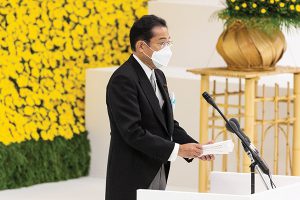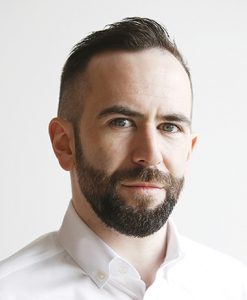Japan observed the end of World War II on Monday, an anniversary that even 77 years later remains a source of contention both domestically and overseas. Statements by the country’s leaders are routinely examined for whether their level of contrition matches expectations.
In the not-too-distant past, it was often a day for prime ministers to visit Tokyo’s Yasukuni Shrine, the Shinto memorial that commemorates the country’s 2.5 million war dead, controversially including WWII war criminals. But since Junichiro Koizumi last went there as leader in 2006, no sitting premier has visited on the war’s anniversary; and of the many leaders Japan has had in the interim, only the late Shinzo Abe went to the shrine while still in office, in December 2013.
Less than a decade on, the world at the time of Abe’s visit seems almost unrecognisable. Back then, headlines fretted about Japan’s increased military spending just as much as they did China’s; the US blamed Japan for increasing tensions with Xi Jinping’s regime, with then-Vice President Joe Biden believed to have been behind a statement expressing how “disappointed†the White House was with Abe. President Barack Obama still spoke of supporting China’s “peaceful rise.â€
Some players remain, notably Xi and Biden; everything else has changed. The US is now the one urging Japan to rapidly increase its defense spending as it seeks to protect the international order from China’s “aggression.†And it’s Washington that’s on the receiving end of a backlash from Beijing for a visit that is largely symbolic. US House Speaker Nancy Pelosi’s trip to Taiwan this month has raised cross-strait tensions to the highest level in decades, and has many wondering if a long-feared military conflict is becoming inevitable.
Comparisons between Pelosi’s visit and those of Japanese leaders to Yasukuni are imperfect to say the least: Unlike the shrine, the island doesn’t usually stir controversy — outside of China, that is. But there are parallels in how Beijing reacts, and uses the disputes for its own means. Just as China tolerated visits to Taiwan by US senators earlier this year but erupted when Pelosi went, so too has the regime accepted Yasukuni visits by Japanese cabinet ministers, but reacted indignantly when it’s the prime minister involved.
The arbitrariness is the point: China gets to dictate the rules. Beijing’s posturing over Yasukuni and other historical grievances with Japan often have less to do with the situation abroad than at home. Facing an economic downturn, dissatisfaction over Covid lockdowns and a looming mortgage crisis, Xi likely relishes the distraction afforded by Pelosi, just as his predecessors have used Japanese textbooks or wartime apologies as convenient tools to stoke nationalistic fervor.
Chinese pressure is also effective: For the most part, Yasukuni has lost its potency as a flashpoint in Japan as, for better or worse, leaders have chosen the path of
least resistance and avoided going.
While reaction from the US and South Korea also played a role, it was the economic impact with its largest trading partner that likely weighed heaviest on Japan, with even Abe avoiding Yasukuni during the rest of his time in office.
It’s clear he would have visited more often if he felt he could. On the very day Abe left top office in 2020, he visited the shrine as an individual, and subsequently
attended on the war-end anniversary last year.
Former Chinese President Hu Jintao once described Yasukuni visits as the “biggest reason for difficulties†in relations between the two countries, but ties are hardly rosy without them. Earlier this month, Beijing canceled a scheduled bilateral meeting with Japan, before lobbing missiles into its exclusive economic zone.
If Abe felt he couldn’t go to Yasukuni, it’s hard to see prime ministers doing so in the near future. The incumbent Fumio Kishida is not a vocal proponent; during last year’s campaigning for Japan’s top job he dodged direct answers over whether he would visit as prime minister. Barring the unexpected elevation to the top office of a firebrand such as the economic security minister, Sanae Takaichi, the shrine might not re-emerge as a tinderbox.
Instead, public debate over how history should be commemorated has shifted to a more unexpected source: the appropriateness of how to commemorate Abe himself. Shortly after his assassination last month, Kishida approved a state funeral, but public opinion is increasingly split on such a move.
—Bloomberg
Gearoid Reidy is a Bloomberg News senior editor covering Japan. He previously led the breaking news team in North Asia and was the Tokyo deputy bureau chief
 The Gulf Time Newspaper One of the finest business newspapers in the UAE brought to you by our professional writers and editors.
The Gulf Time Newspaper One of the finest business newspapers in the UAE brought to you by our professional writers and editors.

